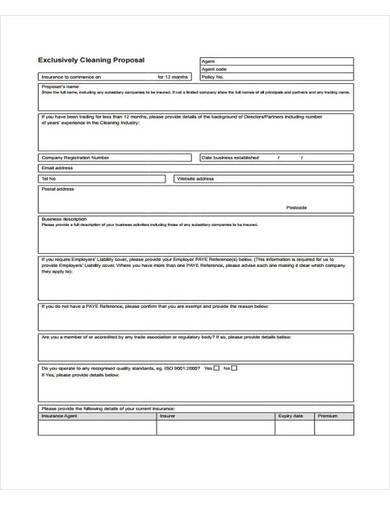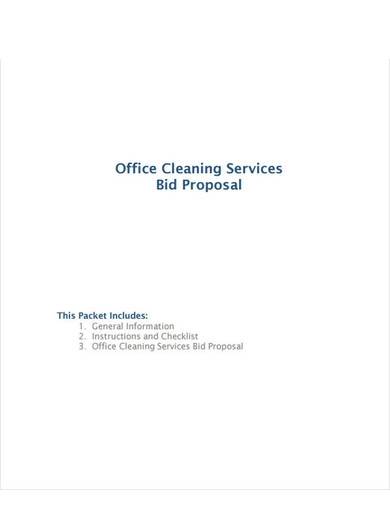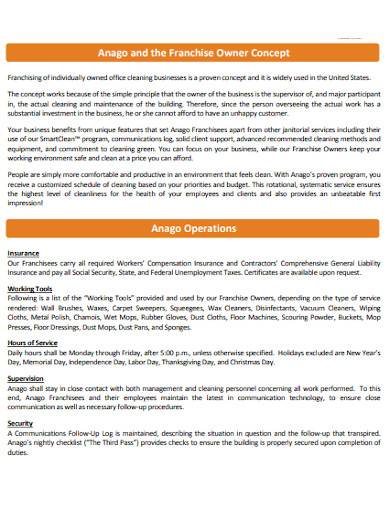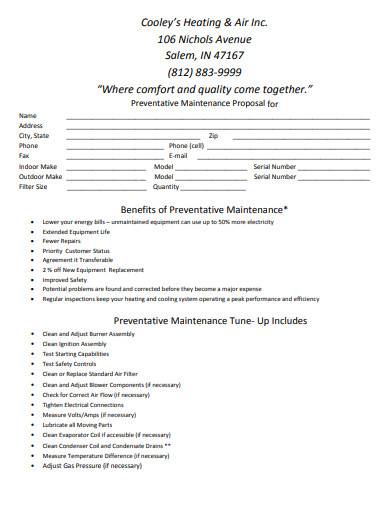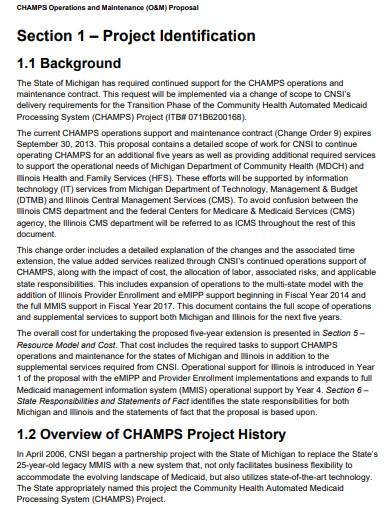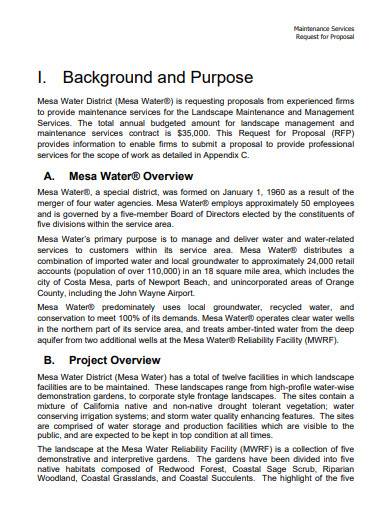What do you do to get customers for your maintenance business? The answer is simple, you offer your services to potential customers. How? By making a highly-persuasive maintenance proposal. You don’t always get the opportunity to meet a client in person, so you can have your maintenance proposal do the talking for you. It works regradless of the type of maintenance service that you offer. Take a look at the different maintenance proposal samples in this article and learn more about it in the details below.
FREE 11+ Maintenance Proposal Samples
1. Maintenance Proposal Template
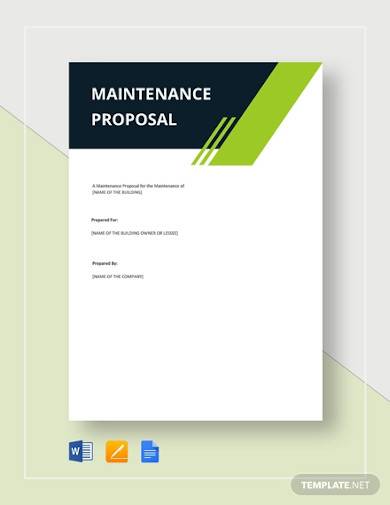
2. Website Maintenance Proposal Template
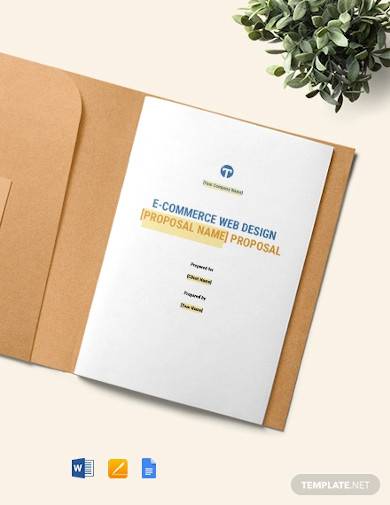
3. Software Maintenance Proposal Template
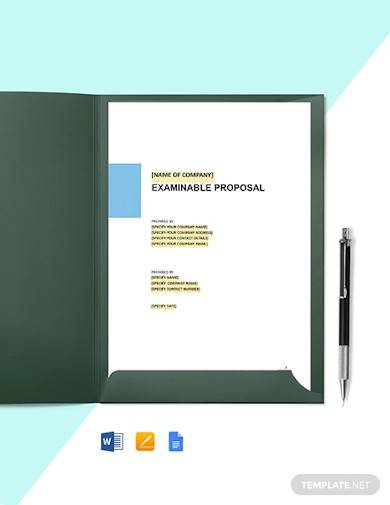
4. Website Support & Maintenance Proposal
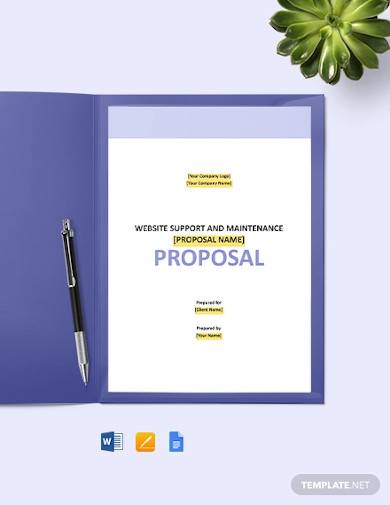
5. Annual Maintenance Contract Proposal
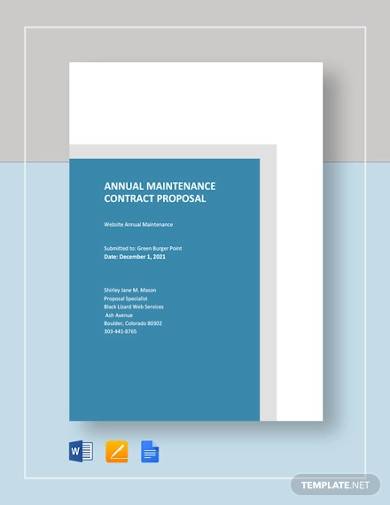
6. Sample Maintenance Services Proposal
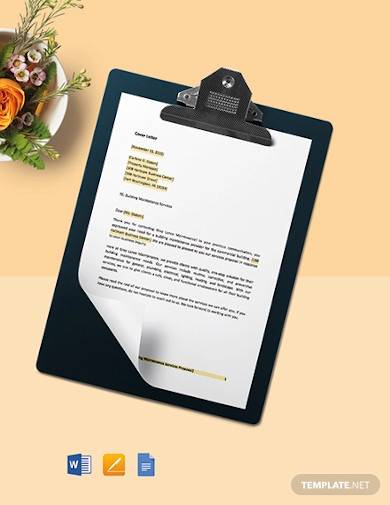
Understanding the Maintenance Proposal
A Maintenance Proposal is a comprehensive document that serves as a blueprint for the processes, methodologies, and strategies proposed by an individual or an organization for the upkeep, repair, or service of a specific asset or system. The primary aim of this sample proposal is to delineate the nature, scope, and pricing of the maintenance tasks to be executed, presenting it in such a manner that it convinces potential clients or stakeholders of the proposal’s value and effectiveness.
Purpose and Significance
The main purpose of a Maintenance Proposal is to bridge the gap between the maintenance provider and the potential client. Whether it’s for a building, machinery, software, or any asset that requires routine upkeep, the proposal lays out what needs to be done, how it will be executed, and what benefits the client can expect.
It’s a tool of communication, fostering transparency and setting clear expectations. When well-crafted, the proposal can serve as a strong foundation for a long-lasting business relationship, ensuring that both parties are aligned in terms of goals, responsibilities, and expected outcomes.
Key Components of a Maintenance Proposal
Introduction: This section provides a brief overview of the proposal, offering context and setting the stage for the details that follow. It might contain the background of the project or a concise statement of the problem that the maintenance seeks to address.
Objective: A clear articulation of what the maintenance tasks aim to achieve. This could be as simple as prolonging the life of a machine or as intricate as optimizing a system for enhanced performance.
Scope of Work: A pivotal part of the proposal, this section dives deep into the specific tasks or services to be provided. It’s where the provider details what will be covered and, just as importantly, what will not.
Methodology: This describes the how. What tools, technologies, or methods will be employed? How will disruptions be minimized? What safety protocols will be in place?
Timeline: Every client wants to know how long things will take. This section offers a detailed schedule, sometimes with milestones, ensuring the client knows when to expect completions or updates.
Budget and Pricing: Perhaps the most scrutinized section, this gives a transparent breakdown of all costs involved – from labor and materials to contingencies.
Credentials and Qualifications: Trust is crucial in any business transaction. Here, the service provider lists their credentials, experience, relevant certifications, and possibly case studies or testimonials, ensuring the client feels they are in capable hands.
Terms and Conditions: This section details any specific stipulations, guarantees, or conditions of service, ensuring both parties are protected and aware of their responsibilities.
Conclusion and Call to Action: A final summary of the proposal, reinforcing its value proposition and often including a direct prompt or request for the client to take a specific action, like contacting for further discussions.
In essence, a Maintenance Proposal is much more than just a list of services and prices. It’s a meticulously crafted document that serves as a testament to a service provider’s competence, understanding of client needs, and commitment to delivering excellence. As assets and systems grow more complex, the demand for detailed, transparent, and compelling maintenance proposals is only set to increase.
7. Sample Cleaning Proposal Template
8. Office Cleaning Proposal Template
9. Building Maintenance Proposal Sample
10. Sample Preventative Maintenance Proposal
11. Operations and Maintenance (O&M) Proposal
Creating a Maintenance Proposal: A Step-by-Step Guide
Creating a well-thought-out Maintenance Proposal is paramount not just for presenting your services to a potential client, but also for setting clear expectations and building a foundation for a lasting business relationship. Here’s a step-by-step guide to crafting an effective Maintenance Proposal:
1. Understand the Client’s Needs:
Before you begin writing, take the time to meet with the client or conduct an initial assessment. Understand what assets or systems require maintenance, the frequency desired, any previous issues they’ve faced, and their expectations.
2. Start with a Clear Title and Introduction:
Your title should be specific and indicate the nature of the proposal, for instance, “HVAC Maintenance Proposal for XYZ Corp.” Following this, introduce the background or context, ensuring the client knows precisely what the document entails.
3. Define the Objective:
In this section, articulate the goals of the proposed maintenance services. Are you aiming to prolong the life of machinery, ensure the safety of an infrastructure, or improve efficiency? Be clear about what the client can expect once the maintenance tasks are carried out.
4. Detail the Scope of Work:
Be comprehensive. List out all the tasks or services you intend to provide. This might include routine checks, cleaning, repairs, replacements, and more. It’s equally essential to specify any tasks or areas not covered in the proposal to avoid misunderstandings later.
5. Describe the Methodology:
Provide insights into how you’ll execute the maintenance. Will you be using specific tools or software? Are there particular methods or best practices you adhere to? The more transparent you are here, the more confidence the client will have in your processes.
6. Provide a Timeline:
Offer a tentative schedule, indicating when you’ll start, any milestones or checkpoints, and an estimated completion date. If it’s an ongoing maintenance contract, detail the frequency of your services.
7. Breakdown the Costs:
Transparency is key. Detail all costs involved, from labor to materials. If possible, provide itemized costs so the client knows precisely what they’re paying for. This section should also cover any additional costs or conditions under which costs might vary.
8. Highlight Your Qualifications:
This is where you build trust. List out certifications, past experience, relevant case studies, or even testimonials from satisfied clients. Ensure the client knows they’re entrusting their assets to a qualified and experienced professional or team.
9. State the Terms and Conditions:
Cover areas like payment terms, the process for any potential disputes, guarantees, or warranties you offer, and conditions under which the contract might be terminated. This protects both you and the client.
10. Conclude with a Call to Action:
Wrap up the proposal by summarizing the key points and urging the client to take the next step, whether it’s setting up a meeting, signing the proposal, or getting in touch for further clarification.
11. Proofread and Review:
Errors can diminish the credibility of your proposal. Ensure it’s professionally written, free of errors, and presented in a clean, organized format.
In Summary
A Maintenance Proposal is more than just an offer of service; it’s a testament to your professionalism, understanding of client needs, and commitment to quality. By following these steps, you ensure that your proposal not only meets the expectations of potential clients but also sets the stage for a successful working relationship.
12. Maintenance Services Request for Proposal
Crafting an Effective Service Proposal: Essential Components
A service proposal is a vital tool for service providers across industries. It serves as a comprehensive document outlining the services a business or individual offers to prospective clients. But what makes a service proposal stand out and effectively communicate its message? Here’s a breakdown of the crucial elements that should be included:
1. Executive Summary:
Begin with a succinct overview of your proposal’s main points. This should encapsulate the problem you’ve identified, the solution you’re offering, and the benefits of your service. A well-written executive summary can entice the reader to delve deeper into your proposal.
2. Introduction:
Introduce your company or yourself, detailing relevant background, experience, and the ethos driving your services. This section establishes context and helps build a rapport with the prospective client.
3. Problem Statement:
Clearly identify and describe the challenge or problem faced by the client. Demonstrating a profound understanding of the issue not only showcases your expertise but also resonates with the client, making them more receptive to your proposed solution.
4. Proposed Solution:
Detail the services you’re offering to address the client’s problem. Be specific about what you plan to do, how you plan to do it, and the tools or methodologies you’ll employ. This section should form the crux of your proposal.
5. Benefits:
Highlight the advantages of your service. What makes you stand out from competitors? Will your service save the client time or money? Perhaps you offer a unique approach or have a proven track record of success. Emphasize the value you bring to the table.
6. Timeline:
Present a clear schedule for service delivery. This includes project milestones, anticipated completion dates, and any other relevant timelines. This assures clients of your promptness and dedication.
7. Pricing Structure:
Provide a transparent breakdown of costs associated with your services. This could be a flat fee, hourly rates, or any other pricing model you utilize. If possible, itemize the costs so clients understand what they are paying for.
8. Credentials and Qualifications:
Establish credibility by showcasing your qualifications, certifications, past projects, and testimonials or case studies. This section underscores your capability and instills confidence in potential clients.
9. Terms and Conditions:
Lay out any specific terms related to your services, including payment terms, service guarantees, contract duration, and any other pertinent details. This section ensures that both parties are on the same page and can prevent disputes down the line.
10. Call to Action (CTA):
Conclude by urging the prospective client to take the next step, whether that’s setting up a consultation, signing the proposal, or reaching out for further details. A compelling CTA can move the client from consideration to action.
11. Contact Information:
Always ensure your contact details are easily accessible, allowing clients to reach out with questions or to initiate the service process.
An effective service proposal goes beyond merely listing services and prices. It resonates with the client’s needs, establishes trust, and paints a clear picture of the value proposition. By incorporating these essential components, service providers can enhance their chances of winning over clients and fostering lasting professional relationships.
Related Posts
FREE 10+ Electrical Proposal Samples in PDF
Student Research Proposal
Building Project Proposal
Business Loan Proposal
Business Project Proposal Samples & Templates
Business Proposal Samples & Templates
Agricultural Project Proposal Samples & Templates [ Engineering, Extension, Development ]
FREE 10+ Event Planner Proposal Samples in MS Word | Google Docs | Apple Pages | PDF
FREE 10+ Executive Compensation Proposal Samples in PDF | DOC
Road Project Proposal Samples [ Construction, Safety, Maintenance ]
School Project Proposal Samples [ Driving, High, Primary ]
Proposal Outline Samples & Templates
Title Proposal Samples [ Project, Thesis, System ]
Proposal Samples
Sports Event Proposal Samples

